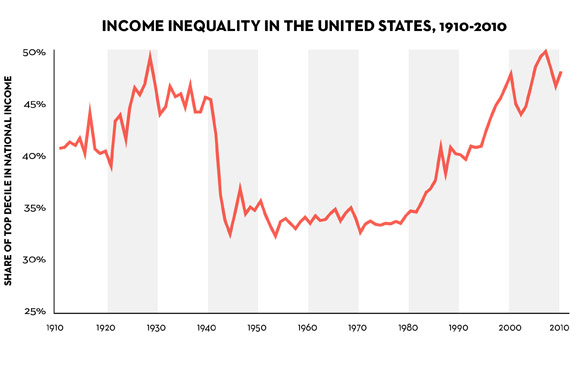A GREEN ECONOMIST ADVANCES, A GREEN ENVIRONMENTALIST SURRENDERS
EPISODE 91

April 22, 1970 was the first Earth Day
Using mountains of data to make the case that capitalism, left to its own devices, concentrates money in the hands of the few at the top, French economist Thomas Piketty is making a splash among the economic intelligentsia in the U.S. with the publication of his new book, Capital in the 21st Century.
Debuting at number one in Amazon book sales, and receiving rave reviews from mainstream media and economists, Piketty has made the rounds of policy makers in Washington DC and New York, challenging the conventional economic orthodoxy that modern capitalism is a great generator of equality. He makes the case that the flatter economic distribution enjoyed by the West after the two world wars was less a feature of laissez faire economics and more a result of the wartime deconstruction of the previous trusts and multi-generational family fortunes.
This looks like a significant shift in elite thinking that may help usher in more egalitarian economic policies over time. It supports Said Dawlabani’s thesis in his book Memenomics: The Next Generation Economic System, which I have examined at length in an earlier Daily Evolver episode, that the Orange altitude economy launched by Ronald Reagan in the 80’s may be re-orienting itself to more Green altitude egalitarian impulses. Along those lines, Piketty advocates raising progressive tax rates up to 80% for the highest earners as well as a worldwide tax on wealth. These are radical ideas to be sure, and are receiving the expected jeers from the political right, but if his thesis is borne out it will begin to change the conversation.
Evolutionarily it’s right on schedule; as Piketty said in an interview with the Huffington Post Live last week, “income inequality is only getting started, and this century could look a lot more like the deeply unequal 18th and 19th centuries than the more-egalitarian 20th.”

More charts about Piketty’s inequality story here.
EARTH DAY 2014
In the second half of the call I honor Earth Day with an update on global climate change, and a look some of the reactions to the recent series of I.P.C.C. (International Panel on Climate Change) reports from the United Nations. The issue is, of course, vastly polarized at the moment with predictable responses from both the climate deniers and alarmists (as the political right and left are known to each other).
One reaction to the climate controversy that is a bit outside the box is that of Paul Kingsnorth, a lifelong environmentalist from Britain, who is leading the way into a new relationship with global climate change: surrender. In a major profile in last week’s New York Times Sunday Magazine he shared his views on the “human machine and the age of ecocide.”
I had a lot of friends who were writing about climate change and doing a lot of good work on it. I was just listening and looking at the facts and thinking: Wow, we are really screwed here. We are not going to stop this from happening.
Everything had gotten worse. You look at every trend that environmentalists like me have been trying to stop for fifty years, and every single thing had gotten worse. And I thought: I can’t do this anymore. I can’t sit here saying: “Yes, comrades, we must act! We only need one more push, and we’ll save the world!” I don’t believe it. I don’t believe it! So what do I do?
The first thing that Kingsnorth did was draft a manifesto…called “Uncivilization,” it was an intense, brooding document that vilified progress. “There is a fall coming,” it announced. “After a quarter-century of complacency, in which we were invited to believe in bubbles that would never burst, prices that would never fall…Hubris has been introduced to Nemesis.”
Five years ago Kingsnorth founded The Dark Mountain Project, a loose organization with a difficult-to-pin-down mission: “When you ask Kingsnorth about Dark Mountain, he speaks of mourning, grief and despair.”
Kingsnorth explains: “Whenever I hear the word ‘hope’ these days, I reach for my whiskey bottle.
“It seems to me to be such a futile thing. What does it mean? What are we hoping for? And why are we reduced to something so desperate? Surely we only hope when we are powerless?”
The NYT article also features Dougald Hine, Dark Mountain’s co-founder, who compares coming to terms with the scope of ecological loss to coming to terms with a terminal illness:
“The feeling is a feeling of despair to begin with, but within that space other things begin to come through.” Yet arriving at this acute state of “awareness of what’s worth doing with the time you’ve got left” isn’t always easy for Dark Mountain’s followers. “Some people come here, and they get very excited by the fact that people are inspired, and they go: ‘Right! Great! So what’s the plan?’ Hind and Kingsnorth have worked hard to check this impulse, seeing Dark Mountain as a space to set aside what Kingsnorth refers to as “activist-y” urges.
“People think that abandoning belief in progress, abandoning the belief that if we try hard enough we can fix this mess, is a nihilistic position,” Hine said. “They think we’re saying: ‘Screw it. Nothing matters.’ But in fact all we’re saying is: ‘Let’s not pretend we’re not feeling despair. Let’s sit with it for a while. Let’s be honest with ourselves and with each other. And then as our eyes adjust to the darkness, what do we start to notice?”
Kingsnorth, Hine and the Dark Mountain movement perfectly distill the dystopian view of many anti-modernists within the Green altitude in general and the environmental movement in particular. They see “the human machine” as sometime other than natural, a cancer on the planet that is at odds with right living. The idea that humans would invent technological solutions to climate change, such as carbon sequestration or geoengineering, are not only futile but immoral. “For Kingsnorth, the notion that technology will stave off the most catastrophic effects of global warming is not just wrong, it’s repellent — a distortion of the proper relationship between humans and the natural world.”
I disagree, of course, and think an evolutionary view embraces the idea that, as Devin Wilson of Integral Life puts it, “technology is a force of nature.” History — including the history of environmental movement — is replete with examples of how technology has fixed the very problems it originally caused. Indeed, this is one of the great themes of the evolution of humanity.
Nevertheless, I am touched by the courage and bracing honesty of Paul Kingsnorth and the Dark Mountain folks.
I do think they have identified an important step in the evolution out of the confusion, hopelessness and malaise that infects so many people at the Green altitude: acceptance leading to the realization that the only way out is through.
From the New York Times profile: “The author and activist Naomi Klein
, who has known Kingsnorth for many years, says Dark Mountain has given people a forum in which to be honest about their sense of dread and loss. ‘Faced with ecological collapse, which is not a foregone result, but obviously a possible one, there has to be a space in which we can grieve…And then we can actually change.’”Let’s hope so — and chase it with a nice shot of whiskey.
Listen on the player or download below. Need some help to listen on your mobile device? Click here. You can also find The Daily Evolver on Integral Life or iTunes. Want to comment on this post? Click here and scroll down.
Podcast: Download
Subscribe: Google Podcasts | RSS





